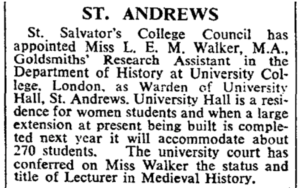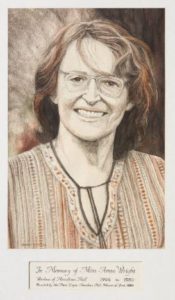Wardens as Historians
Women’s colleges and residences provided important job opportunities for early women academics. Unlike Cambridge, Oxford or London, St Andrews did not establish women-only colleges, but it did have women-only residences. These were run by wardens. Not all of the early wardens had academic responsibilities in addition to their wardennial roles; but by the middle of the twentieth-century, an appointment as warden provided a route to an academic job for (at least) two women historians of St Andrews.
When the University of St Andrews began to admit women degree students, from 1892, it did not set up separate women-only colleges for teaching and residence (as Cambridge, London and Oxford had done). Teaching was co-ed. But, in an effort to reassure the parents of potential women students, the University authorities decided to set up a women-only hall of residence, University Hall, in 1896. This was an unusual move, since, in common with other Scottish universities, St Andrews had moved away from a residential model earlier in the nineteenth century: (male) students generally lived in private lodgings in town. In the decades following the creation of University Hall, St Andrews created more residences, for both men and women students, including St Salvator’s Hall and McIntosh Hall. By 1939, St Andrews was in the ‘exceptional position’ (according to the Alumnus Chronicle in 1958) of being able to house over three-quarters of its students. With the post-war expansion in student numbers, keeping up this position required an expansion of residences in the late 1950s and 1960s.
It was in the 1960s that Lorna Walker and Anne Wright became wardens of University Hall and Hamilton Hall, respectively. In addition to substantial wardennial duties, both also had teaching roles in the departments of History. An analysis of their experiences highlights both the opportunities and the constraints of holding the two roles in conjunction. The university calendars and the Alumnus Chronicles suggest that their academic involvement and achievement were often seen as secondary to their role as wardens.
Lorna Walker was Warden of University Hall from 1961 until her retirement in 1991, and taught in Mediaeval History.
Anne Chaloner Wright was Warden of Hamilton Hall from 1966 until her death in 1981, and taugth in Modern History.

The advertisement in The Times for Warden in University Hall in 1961 made clear that duties of Warden were to take priority, but the role would also be combined with university teaching or research. It is perhaps not surprising why university documents privilege their residential role over their academic one.
Wardens occupied a position of responsibility and leadership within the university, and they received a salary that (starting at £1,400 pa) was similar to that of a Senior Lecturer (e.g. Doris Ketelbey), but with the benefit of free board and lodging. The requirements of the Warden’s role did, however limit the time available for teaching, research or scholarship.

Lorna Walker had been an undergraduate student at St Andrews – and at University Hall – in the late 1940s and early 1950s. She took a First Class degree, and won the Janet Low Prize. She then worked as a research assistant in London. On her return to St Andrews as Warden in 1961, she was appointed as lecturer in Mediaeval History – though later documents describe her appointment ‘as Honorary Lecturer in Mediaeval History’. Her appointment as Warden appears to have been the more secure, as her lectureship had to be renewed from time to time by the University Court (e.g. University Calendar, 1965-6, p.129).
Anne Wright had a different career path: she too had graduated from St Andrews (in 1946), but she then spent almost twenty years as a secondary school teacher, first in London and then in St Andrews. She was appointed Warden of Hamilton Hall in 1966, and had a teaching role in the department of Modern History. She died in post in 1981, and her obituary in the Alumnus Chronicle emphasised the stereotypically feminine, caring nature of the Warden’s role, rather than any academic achievements.

She was said to have a “great sense of compassion”, “devoted to the welfare of others” and have “capacity for friendship”. It was clear that her position of Warden took precedence over her departmental role: “members of Hamilton Hall… have most cause to be aware of [her concern for the well-being of all associated with her], but it extended in equal measure to her students and colleagues in her department” (University of St. Andrews ‘The Alumnus Chronicle’, no. 72, June 1981, p. 45).
These descriptions starkly contrast with the way in which male Wardens were discussed. For example, a discussion of male residences in the Academic Calendar of 1951-1952, refered to Wardens with phrases such as “disciplinary powers” and “full powers” rather than the more gentle language used to describe the female wardens (University of St Andrews Calendar 1951-2, p. 49). It seems pertinent that the caring – perhaps even maternal – qualities of the aforementioned female wardens is prioritised in a way that cannot be said for their male counterparts.
Being Warden affected how these women were regarded as scholars: they had less time for teaching or scholarship than regular lecturers; and it became easy to portray them in stereotypically caring, pastoral terms. It is perhaps difficult for modern staff and students to appreciate the substantial managerial and financial, as well as pastoral, responsibility that came with being a Warden in this period.
Sources
University of St. Andrews Alumnus Chronicle, no. 72, June 1981
University of St. Andrews Academic Calendars from 1951-2, 1965-6
